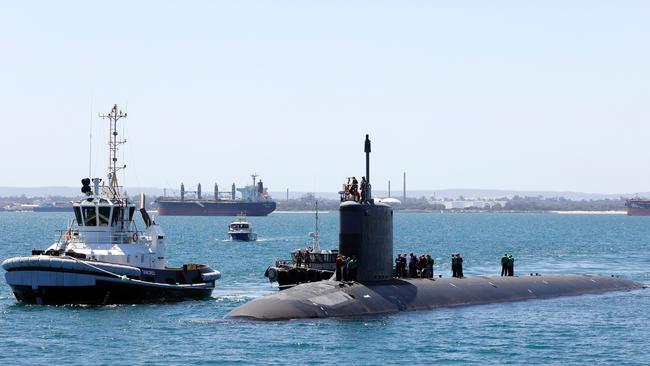‘Ill-prepared’ Australian firms need nuclear certification to purse AUKUS contracts
Australian firms are ill-prepared to compete for lucrative AUKUS submarine contracts with just one having been certified under the globally recognised nuclear safety standard that is expected to be mandated for the program.

Australian firms are ill-prepared to compete for lucrative AUKUS submarine contracts, with just one certified under the globally recognised nuclear safety standard that is expected to be mandated for the program’s private sector partners.
Technology services company UBH Group, which received the ISO 19443 certification in October, has warned firms to begin the accreditation process if they want to be considered for AUKUS work when US and UK nuclear submarines begin operating from Perth in 2027.
The only other organisation in Australia to have been certified under the standard is the Australian Nuclear Science and Technology Organisation, which operates the nation’s nuclear research reactor at Lucas Heights.
The Australian Submarine Agency and its AUKUS construction and maintenance partner, ASC, said they were still considering whether their organisations needed to be accredited under the standard.
The ISO 19443 standard was developed in co-operation with the International Atomic Energy Agency to ensure nuclear safety culture is embedded in organisations that supply products and services to the nuclear industry.
Australia’s future naval nuclear safety regulator is yet to be established, but the government has pledged to implement the highest possible nuclear safety standards across the AUKUS program.
UBH chief nuclear officer Mark Schneider said companies would need to meet the nuclear “gold standard” to bid for contracts linked to visiting US and British boats, and future tenders linked to Australia’s planned Virginia-class and domestically manufactured AUKUS subs.
“Right now, just to support Submarine Rotational Force West, which is the program to do maintenance on five US and UK submarines, we’re probably looking at between 60 and 100 companies that are going to need to either get that certification or work under a company with certification,” Mr Schneider said.
“In order to get set up, to get the skills necessary, companies in Australia need to act now, because it is going to take time to get those skill sets up, those processes and procedures in place, to be nuclear-ready.
“I don’t want to say we’re in crisis, but if we don’t act quickly, Australia could easily get into crisis with SRF West, and have to kick that (schedule) to the right.
“And my concern is that the Australian Submarine Agency is somewhat wanting the companies of Australia to make the decisions for them when it really does need to come from the top.”
Mr Schneider said even companies supplying seemingly innocuous products, such as duct tape, would need to prove they were nuclear-compliant.
“You’ve got to get your tape certified, your adhesive, your bolts, your paint. You’ve got to get your workers certified – that could be anything from welders to mechanics. It’s a cultural and workforce shift,” Mr Schneider said.
He said construction companies and subcontractors involved in developing AUKUS infrastructure at Perth’s HMAS Stirling and Henderson shipyards would also need to be accredited.
Glasgow-based nuclear safety auditor Lynn Williams, who worked with UBH and ANSTO to achieve their ISO 19443 certifications, said the standard was key to ensuring nuclear accountability across an organisation.
Dr Williams, who gave evidence to a Senate inquiry on the establishment of Australia’s naval nuclear safety regulator, said the accreditation process required companies to prove they had a comprehensive, blame-free reporting system to ensure nuclear safety issues were acted upon.
“It’s giving the workforce the gift to put their hand up and say, ‘Something’s not quite right’, and action that,” she said.
“And then the standard requires someone independent who has a direct line to senior management who is responsible for any nuclear issues on site or within their supply chain.”

An Australian Submarine Agency spokesman said: “Nuclear safety and quality is paramount for the nuclear-powered submarine enterprise.
“The most appropriate quality management system for an organisation must be carefully chosen to suit the nature of the business as a whole, or specific parts of it.
“The ASA is considering which quality management system standards best suit the parts of the enterprise at different stages of its life cycle, drawing on the expertise and experience of nuclear organisations in Australia, the US and the UK.”
The agency has awarded several contracts to Australian firms in recent months under a vendor qualification program aimed at bringing local businesses into the US and British nuclear submarine supply chains. The companies will manufacture samples of standard US Navy valves and pipe fittings as part of the qualification process.
Australian steel manufacturer Bisalloy Steel has also been awarded a contract to qualify its steel for Australia’s future AUKUS submarines to be built in Adelaide in the early 2040s, and will produce training and testing samples for US shipbuilder Newport News Shipbuilding.
An ASC spokesman said safety was its top priority and the organisation would “carefully consider all options for appropriate quality management systems”.
“We will also be helping uplift our supply chain partners to appropriate levels of compliance,” he said.
ANSTO said its move to obtain ISO 19443 certification last year was part of its ongoing commitment to nuclear stewardship and safety as Australia’s largest nuclear organisation.
“We are already meeting best practice in the nuclear industry, and obtaining this certification merely enabled ANSTO to bolster our strong nuclear safety culture, performance and credentials,” its spokeswoman said.
“This ISO certification aligns with the International Atomic Energy Agency and complements their safety standards that are firmly embedded across our entire operations – from the management of our nuclear research reactor, OPAL, through to our nuclear medicine production and research projects.”




To join the conversation, please log in. Don't have an account? Register
Join the conversation, you are commenting as Logout